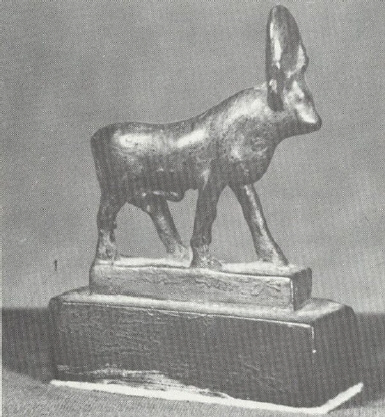What Civilization Owes The Canaanites -- By: Anonymous
Journal: Bible and Spade (First Run)
Volume: BSP 03:4 (Autumn 1974)
Article: What Civilization Owes The Canaanites
Author: Anonymous
BSP 3:4 (Autumn 1974) p. 98
What Civilization Owes The Canaanites
At the outset we should pause to get our bearings, and recall the exceedingly important role which the Canaanites have played in the history of civilization, quite apart from their influence on Isræl. Just as the roots of our Western culture lie in the civilization of the Greeks and the Romans, so the roots of the Græco-Roman culture lay in the Orient, the mediating influence having been the Canaanites (or Phnicians—after 1200 B.C. the two are synonymous). It is from these remarkable people that the Greeks borrowed the alphabet and passed it on to us, and today nearly all literate people on the globe, with the exception of the Chinese and Japanese, use some modified form of the Phnician alphabet. Innumerable architectural and mythological details, many of which still survive, can be traced through Greece to Canaan, and thence to other areas of the Near East.
During the third and second millennia B. C. the Canaanites were in control of practically the whole of Syria and Palestine. Their commercial and artistic enterprises were many, one of the chief of which was the manufacture of purple dye. This we know, not only from ancient texts,
BSP 3:4 (Autumn 1974) p. 99

Apis the Egyptian bull god (see Jeremiah 46:15, R.S. V. or N.E.B.).
but also from the names of the country. It has recently been shown that the Greek name “Phnicia” must refer to the purple industry, and “Canaan”, the name by which the inhabitants designated their own land, probably refers to the same thing. The color was derived from the shellfish or mollusc, Purpura, native to the eastern Mediterranean coast. Tyrian purple through many subsequent ages was the most celebrated of all colors for dyeing. Since it was very expensive, only the wealthy could purchase it, and robes in this color became a mark of high rank, whence the phrase “born to the purple.”
By the eleventh century B. C, however, a great disaster had overtaken the Canaanite peoples. Isrælites had deprived them of the most of Palestine; Aramæan invaders had taken most of eastern Syria; and the Sea Peoples (among them the Philistines) had swept over the Mediterranean area like a flood, devastating the Canaanite coastline of Syria and Palestine. In the centuries which followed, having lost nine-tenths of the territory previously occupied, the Phnicians turned most of their attention seaward and became the greatest sea-trading people of history, founding commercial colonies on the shores and islands of the Mediterranean as far as Spain. A vivid description of this activity, the best one we have from antiquity,...
Click here to subscribe
